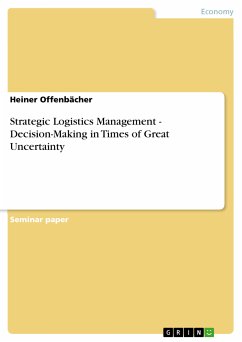Seminar paper from the year 2006 in the subject Business economics - Supply, Production, Logistics, grade: 1,0, European Business School - International University Schloß Reichartshausen Oestrich-Winkel (SMI - Supply Management Institute), course: Seminararbeit Logistics and Business Engineering, language: English, abstract: In the light of the ongoing globalization and evolution of today’s business world logistics has gained significant visibility and is regarded as a critical link to improved corporate performance. The value of the global logistics market accounted for $591.1 billion in 2005 and is expected to further grow by 22.1% until 2010. Apart from a constant pressure to reduce costs and improve efficiency, logistics increasingly serves as a differentiating feature for products and an important lever for improving customer satisfaction. Coordination with other departments also plays a crucial role. The increasing complexity and dynamics of the business world did not leave logistics unaffected. Key drivers of uncertainty include globalization of supply and customer bases, shortening of product life cycles, increasing competition and more demanding customers. Thus, the challenge for logistics managers nowadays is to constantly balance a need to perform well on hard measures of performance, while responding to a constantly changing environment. With respect to logistics increasing importance for corporate success, reacting to contingencies by crisis management and firefighting is no longer an option. Instead, logistics managers must proactively and strategically plan for the future and prepare for change.









